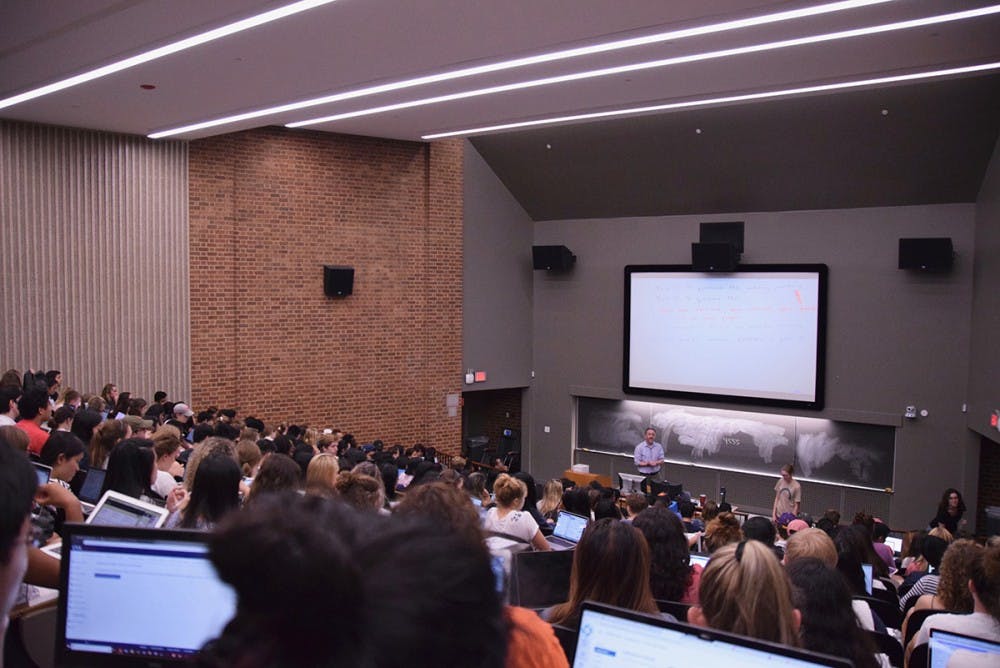As I walked through the door into my Chemistry 1410 Expo section on the second week of class, I was feeling exhausted, defeated and completely lost in the massive amounts of material thrown at me — it was like I was expected to know every theory of quantum mechanics on the first day of a self-proclaimed “Intro to Chemistry” class. Throwing down my backpack and collapsing into my chair, I looked around at my table of classmates. We were all equally unique, talented and bright students who wore the same dark circles and worried expression. We, the hopeful future doctors and engineers, were being beaten down by a class that was not designed to promote success. A class with the very purpose of weeding out those who may not be as strong in an intro subject so class sizes can be decreased and the professors running the program can determine who the truly dedicated are. The intent is good, but does this mentality of “survival of the fittest” truly belong in a college lecture hall? Or does it prevent diversity of background and perspective from seeping into these large “tracks,” leaving students in the dust as it continues to promote a singular, uniformed model of the perfect pre-Med or pre-Comm student?
The framework and ideology behind large intro-level classes affect students who do not come from a privileged background, and target students who have intellectual aptitudes that are not based in traditional areas. This prevents diversity and inclusivity in the hallmark pre-requisite tracks, and creates a process biased towards only certain types of people with specific strengths. It limits the English major who excels in discussion and public speaking, allowing them to improve the direction of a company through inspiration in ways someone who can sit alone and analyze market trends could not.
The current structure of many introductory classes also refuses to acknowledge that students come from all different types of backgrounds, and may not have had access to the same resources as other students. A first-year student may dream of becoming a doctor, but they did not have access to an accelerated chemistry program in high school, so they come into Chemistry 1410 with little prior knowledge. Without any sort of additional resources provided for students who may not know everything about the Bohr model or orbital structures before coming into class, this student is set up to fall behind and have a very difficult time catching up.
As I talked to fellow students about their experiences in these classes, their irritations truly encompassed the primary issues with the structure of this class. Many, especially those who did not have AP Chemistry courses offered at their high schools, felt constantly frustrated with the limited resources available to them. With no textbook given in this class and TopHat (an online program used for homework assignments) programs operating under the assumption that students already have a large bank of knowledge to pull from, there are no clear, reputable, easy to access, and affordable resources for students who come into class already behind due to their lack of prior knowledge. When they would inquire about where to gain access to the information they were missing, the professor would say to “Just Google it.” The students lamented that they didn’t even know what information they needed, so how were they supposed to “just Google it?” And how were they to determine what websites are reputable? Students are being punished for not having access to the same background knowledge as other students — a type of discrimination that handicaps talented students who quickly fall behind in what is suppose to be an introductory level class. The weed-out mentality of intro-level classes prevents students with a variety of backgrounds and perspectives from succeeding in their respective programs.
But what good does this “survival of the fittest” mentality do? How does creating a prerequisite program that only caters towards one set of students help our society in the long run? By making these classes so difficult to succeed in, it creates an environment where only certain types of students are able to continue on in their studies. Bright students are struggling through these classes simply because they lack background knowledge, the knowledge introductory classes are supposed to provide. In order to create a community of scholars, we need to value all of our different individual experiences as equally deserving of opportunity. We need to start holding these classes accountable for what they are really doing — discriminating against students who come from less privileged backgrounds, and preventing students who hold different strengths and perspectives from succeeding.
Isabelle Aldridge is a Viewpoint Writer for The Cavalier Daily. She can be reached at opinion@cavalierdaily.com.







